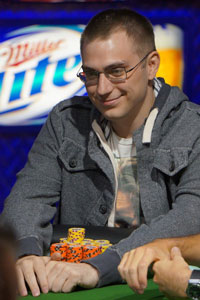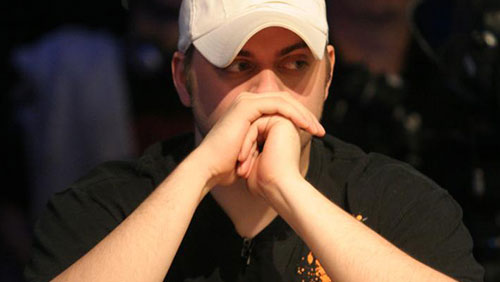Max Lehmanski opened to 40,000 in the cutoff, David ‘Bakes’ Baker three-bet to 112k on the button, Lehmanski four-bet to 210k, Baker moved all-in for 900k and Lehmanski called.
 It was ace-queen for Baker, ace-king of diamonds for the German and the [Jd] [Td] [9d] flop left Baker drawing as dead as a Dodo.
It was ace-queen for Baker, ace-king of diamonds for the German and the [Jd] [Td] [9d] flop left Baker drawing as dead as a Dodo.
“Payouts!” Baker shouted with a smile.
His 15th place finish in Event: #52: $25,000 No-Limit Hold’em (NLHE) was Baker’s eighth cash of a World Series of Poker (WSOP) that has seen him grace four final tables. A feat that has seen him rise above Daniel Negreanu as the current WSOP Player of the Year (POY) front-runner.
I don’t normally like to approach players for an interview after they have bust, but considering Baker is eating cashes for breakfast I felt the water was warm enough to jump in. It was the first time I had spoken to him and I found him to be charming and welcoming.
Baker is another player who invests his time wisely, by speaking to some of the most talented players in the game as an aid to continuous poker improvement. Players and friends like Stephen Chidwick who remains a strong contender in the $25,000 that Baker exited from.
“I have a lot of friends who are good players and we are always talking about hands, thinking about plays we have made and really improving our games in the off time we have. We are all trying to make conscious efforts to improve every tournament and to play every spot better the next time we encounter it.” Baker told me.
He won his first WSOP bracelet in 2010 when he took down the $10,000 No-Limit 2-7 Draw, and his second followed in 2012 when he took the $10,000 H.O.R.S.E.
“I only started playing mixed games about three years ago. In the build up to the 2010 WSOP I saw how many mixed games they had and decided I wanted to play them. There aren’t as many books or training sites available for mixed games, but Stephen Chidwick and I worked on it for a little bit and established a baseline in all of the games. From there it’s just about playing hands and becoming more competent.”
After speaking to Ruben Visser it was an interesting contrast to speak to Baker. The Dutchman was insistent on his need to create multiple streams of income, whereas Baker was keen to invest his money in himself.
“I have a few long terms things, but I mainly just play poker. I don’t put my money to work in anything other than poker. All of my focus is on my poker game right now. I still have more opportunity to put more money into my own poker game. I think my best return, at this point of my life, is on myself. “ Said Baker.
Although I don’t believe Baker’s policy is necessarily the right approach, you can’t argue with his decision when you look at his success. Baker has created six-figure streams of income, through live poker, in each of the past five years, and that doesn’t take into consideration his results online. A form of poker that Baker has to travel to Mexico in order to play; something that angers him a great deal.
“The only future I think about is getting online poker back in the United States; back in my own house. Poker is nice, it’s my job and it’s what I want to do, but at a fundamental level people shouldn’t be telling me what to do. It’s a very American game and I don’t know why I can’t do what I want to do.
“There’s no reason why I shouldn’t be able to play with someone across the country. Legalize it, tax it, regulate it and let’s go. People who live in South Dakota and grinded micro stakes to avoid working in McDonald’s can’t move to Mexico. Instead, they’re now stuck in McDonald’s.”
Not a place for this particular Baker, that’s for sure.
